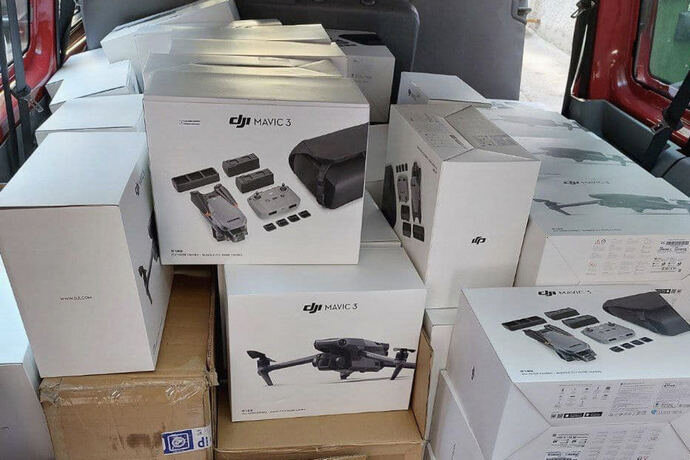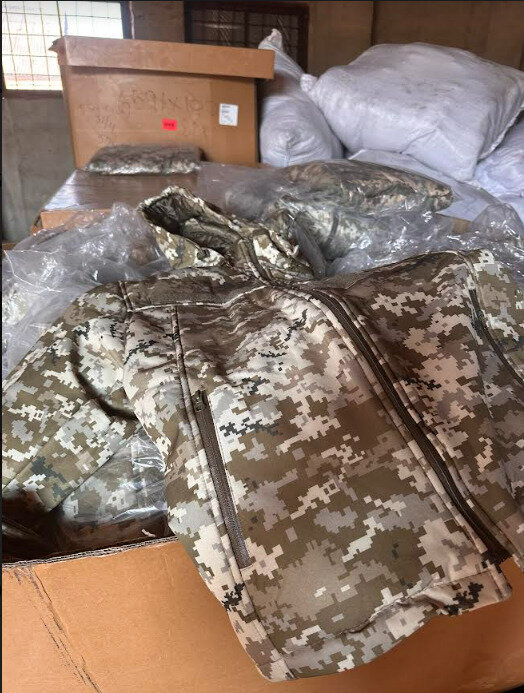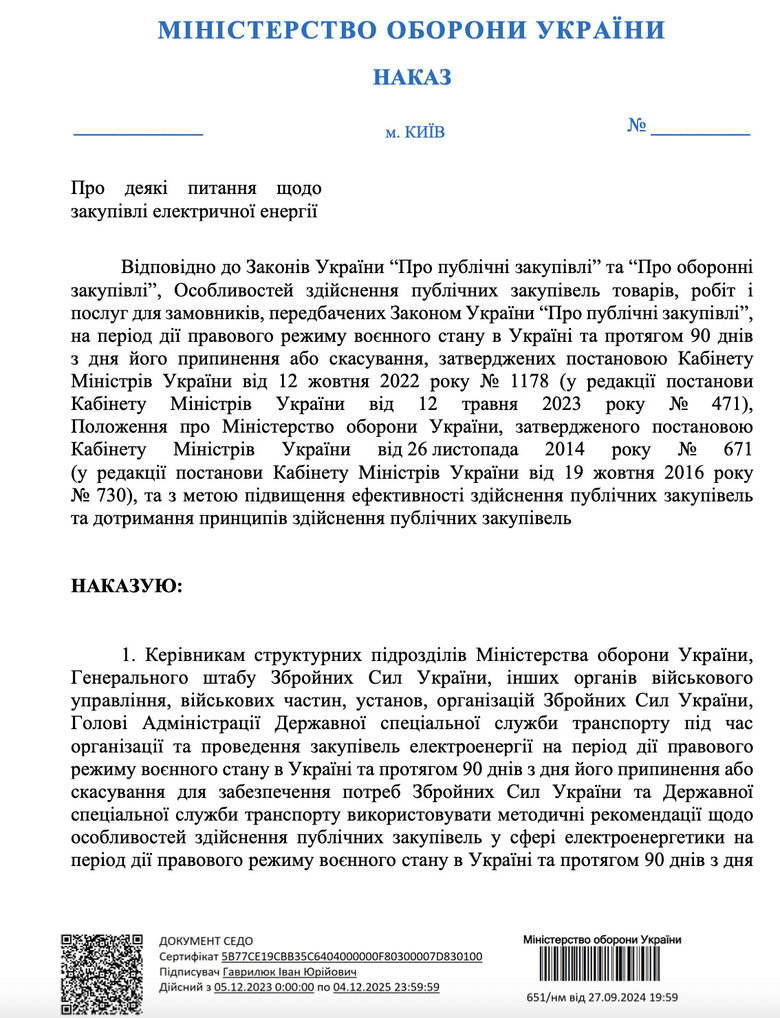Whether military units will be left without electricity, or Why army needs acquisition executive
In case you didn’t know, in addition to centralized procurement at the level of two Defense Ministry agencies, the AFU also have procurement at the level of military units. So far, their development has failed, despite the fact that they are a NATO requirement. And the Ministry of Defense’s illiteracy on some issues can lead to the fact that it will be extremely difficult for the military to purchase electricity.
What is wrong with decentralized procurement, Censor.NET analyzed.
What is decentralized procurement? This is a part of procurement that is increasingly being carried out by military units of the Armed Forces of Ukraine in response to urgent operational needs. For example, last year, a significant portion of fuel and lubricants purchases were made through decentralized procurement. In 2022, through decentralized procurement, units were able to purchase winter clothing and footwear, as the Ministry of Defense had failed to do so.
"We have items that we could not buy through centralized procurement at all. This concerns vehicle repairs. For example, we can get an order for armored vehicles from the Ministry of Defense, but we have to wait in line or go to the factory and arrange it ourselves. And it is both faster and cheaper. I won't even tell you why it's cheaper. Maybe the repairs are more complicated," says Nelli Stelmakh, a servicewoman in the Armed Forces.
Nelli has been an Acquisition Executive at one of Kyiv's TDF (Territorial Defence Forces) brigades for the past 2 years. Therefore, she has experienced all the benefits and misfortunes of decentralized procurement.
"Brigades often have up to a thousand units of various equipment, from VAZ to trucks/tractor-trailer units, and it is also impossible to transport them centrally for repair. In addition, the units could still buy the necessary goods for themselves, buy jackets and boots (when the Ministry of Defense failed to do so in 2022), as well as such seemingly insignificant things as paper and kitchen utensils," Stelmakh adds.
Decentralized procurement for the Armed Forces has existed for a long time, but with the beginning of a full-scale invasion, much more money has been allocated to it. For example, as of August 2024, decentralized procurement from local government budgets and personal income tax funds has spent approximately 19 billion - this is Kyiv's collection of all local taxes in 2023. And this is despite the fact that the budget for financing TDFs at the expense of personal income tax was reduced by 2/3 compared to last year.
According to the strategic review of defense procurement, developed in close cooperation with NATO representatives, it is recommended to increase the ability of military units to make defense procurement (decentralized defense procurement).
This includes the establishment of "a clear structure governing decentralized procurement processes, the development of guidelines for best practices in decentralized procurement, and the training of procurement/contracting officers (when such a position is introduced) in units to manage procurement activities through an institutionalized system with clearly defined delegations of authority."
The Ministry of Defense of Ukraine should be the leading institution in this process. It should be...
The methodological guide was developed (by the MoD Change Support Office and the Defense Procurement Reform Project), and more than 300 people were trained as acquisition executives by the National Defense University of Ukraine and experts.
But there is no position of acquisition executive in the units. Accordingly, most of those trained have gone to other, often combat positions to get higher pay.
Currently, the General Staff is categorically against the introduction of new positions. The motivation is that there are already not enough people at the front.
In fact, acquisition executives could even be easily recruited - there would be many people willing to fill this position.
But in order to recruit these people, it is necessary to have a position in the Armed Forces. It is even possible not to create a new position, but to rename an existing one, because someone is doing this work anyway.
But the General Staff is still against it. They believe that the head of the financial service can do this job.
Perhaps, but this person already has a lot to do, and therefore, for monitoring the market, he or she is likely to issue three offers from one supplier, which may even come from three different companies. Often, the head of the service makes a sole decision on the choice of a supplier, without taking into account the need of regulation, transparency and control.
"Basically, if you have other workloads, you cannot be an acquisition executive," says a military officer who asked to remain anonymous.
Most of the funding for the TDF brigades comes from personal income tax and subventions from local governments. To understand: in 2023, this distribution in some military units was as follows: 98% of funds from local governments, a little more than 1.5% from the state, and the rest from philanthropists.
Last year, this distribution of personal income tax decreased from 30% to 10%. However, even so, the brigades are able to receive additional money from subventions. Plus fundraising. Some brigades even have so-called professional "carolers," which significantly improves their support.
So, all this communication with local governments, "caroling for money" takes a lot of time. Just like concluding direct contracts and conducting competitive procurement can take from 16 to 60 hours. Depending on whether we are talking about a direct contract or an open tender with special aspects.
In addition, the acquisition executive must keep abreast of changes in regulations. In addition to the laws on defense and public procurement, there are also resolutions of the Cabinet of Ministers. For example, last year, Resolution 1275 of the Cabinet of Ministers was jointly rewritten by the Ministry of Economy and the Ministry of Defense, and now the Ministry of Strategic Industries is also involved.
At the same time, when they write these resolutions, they think only about the Defense Ministry, not the National Guard, the State Emergency Service or the Security Service, which also live by these laws. As a result, the SSU went into public procurement through Prozorro.
Plus, there is a ministerial order on the Authorized Person. According to Nelli Stelmakh, the provision narrows the legislation, and this cannot be.
So, there is a person who has to monitor the market, negotiate with manufacturers, monitor changes in regulations, and yet has no appropriate employment. Most of the people who are responsible for procurement in some units have a completely different position. With a different workload. Sometimes a machine gunner, sometimes a stoker. In the ideal case - a clerk.
"And then you get an operation instruction saying that you have to go to the combat zone. You pack your large suitcase. And then, on the way out, the head of the financial support department suddenly chases you, screaming: "Where are you going? You've got millions coming," the soldier shares his sad experience.
At the same time, if this person violates the provisions of the Code of Administrative Offenses, for example, Part 3, both he and the unit commander may face a fine of 25 to 85 thousand hryvnias. This is for purchasing goods in violation of procedures.
And if you violate part 6 of Article 164-14, you can get a fine of 170 thousand.
Or you can become a defendant in criminal proceedings.
Perhaps this is why units often do not spend the funds allocated to them to buy what they need.
In fact, the last example I will give in the text proves once again the need for such a qualified specialist for a military unit.
It concerns the specifics of electricity purchases for military units. On September 27, 2024, the Ministry of Defense issued an order signed by Deputy Minister Ivan Havryliuk (apparently, the minister himself was on a business trip at the time, and Havryliuk, as a career military officer, was definitely not involved in the preparation of this document), which prescribes the rules for the purchase of electricity.
The order itself provides for the procurement of electricity through open bidding with specifics in accordance with CMU Resolution 1178 as amended on April 2, 2024.
Despite the fact that this is considered the most transparent procurement method, it is the most complicated procurement method available to defense customers.
And since we are talking about military units that buy electricity 1-2 times a year, it will be quite difficult and time-consuming for them to study more than 70 pages of recommendations.
Last year, only 10% of units made a contract under this procedure. 60% were purchased without using the electronic procurement system.
If the order had also referred to Resolution 1275, it would have made it possible to purchase electricity in simpler ways - through Prozorro Market and simplified procurement, and in some cases, through direct contracts.
These methods would shorten the procurement time, administrative and material costs of the procedure, and significantly reduce the risks of procurement errors, which, as we have already understood, are not even allocated to a separate staff unit.
Instead, a complicated procedure can lead to disruption of procurement and inefficient use of funds.
In accordance with the recommendations of the Ministry of Economy, the procurement of electricity is carried out by the customer on the basis of the existing need or in case of the planned need for the next year (planned needs of the following periods). The purchase of electricity, regardless of its cost, is included in the annual procurement plan and carried out in accordance with it.
"In order to promote competition among tenderers and improve tender performance, it is recommended that contracting authorities publish the annual procurement plan in advance (for example, at the beginning of the year) to enable potential tenderers to better prepare for the procurement procedure," the recommendations say.
Firstly, there are doubts that some of them have published such a plan, since most of them work under defense legislation, which does not provide for an annual plan. Secondly, according to the same Recommendations, it is proposed to determine the expected cost for procurement based on the last month's price on the "day-ahead" market. Given the current conditions in Ukraine, it is questionable to guess such a price for the annual plan.
Another nuance is that the Ministry of Economy recommends not to enter into separate additional agreements on changing the price per unit of goods, but to agree on the new price in the acts of acceptance and transfer of goods. At the same time, it provides for the conclusion of separate additional agreements to increase the total price of the contract in case of exceeding the estimated amount of the contract.
However, this contradicts part 3 of Article 632 of the CCU.
That is, if the representatives of the unit agree to revise the price in the acts, they will certainly become objects of interest to law enforcement agencies. At least to the extent of the above penalties.
And finally, any electricity consumer who fails the bidding process is automatically switched to the Supplier of Last Resort until they conclude a contract with a regular trader, which is almost always more expensive.
The list of pitfalls could go on, but this is enough to highlight the three main problems of decentralized procurement:
- There is less money compared to last year due to the reduction of personal income tax;
- regulations are constantly being rewritten and not always with high quality;
- military units do not have an authorized representative who would monitor the legislation and monitor the market.
Consequently, all decentralized procurement remains at risk of establishing corrupt ties - if the first supplier has got it, flaunt it. In other words, money.
Well, the purchase of electricity may just be the moment of truth in the dispute over whether military units need authorized representatives or whether a machine gunner can conduct an open tender with special features. Although, of course, it would be easier to add a reference to another resolution (1275) to the order.
Tetiana Nikolaienko, Censor. NET



